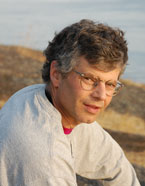We are happy to welcome Danny Grünbaum at the Centre for Ocean Life. He is a Visiting Professor who is joining us from the University of Washington. Below he introduces himself.
 I am currently a Visiting Professor at the Centre for Ocean Life, a Villum Kann Rasmussen Centre of Excellence, with generous support from the Velux Foundation.
I am currently a Visiting Professor at the Centre for Ocean Life, a Villum Kann Rasmussen Centre of Excellence, with generous support from the Velux Foundation.
My research focuses on improving our understanding of important characteristics of marine communities and ecosystems, such as productivity, diversity, resilience, and evolutionary change. I am particularly interested in research problems that combine fundamental discoveries in organismal biology with direct applications in engineering, resource policy or human health, such as harmful algal blooms, predictive ecosystem modeling and algorithms for coordinated control.
My students and I use a variety of scientific approaches to address these problems: We conduct laboratory and field experiments, often using computerized motion tracking of protists, marine invertebrate larvae and fish to quantify these organisms' movement behaviors and fine-scale spatial distributions. We use biomechanical modeling to infer the functional consequences of organisms' morphologies for locomotion and sensing within their fluid environments. We use population-level models to infer how these individual-level characteristics are reflected at larger space and time scales in ecological and evolutionary dynamics, under the influence of environmental variability such as “patchy” resources and stresses such as ocean acidification. We are currently applying our novel motion-tracking technology to develop a low-cost harmful algal bloom detector network in Puget Sound. We are heavily invested in leveraging our analytical and technical research innovations into effective K-12 education and public outreach to teach quantitative critical thinking skills.
At the Centre, I will collaborate with faculty, post-docs and students in applying hydrodynamic models to investigate the biomechanics of swimming and sensing in copepods and other important plankton; in developing new predictive models of predator-prey interactions and harmful algal blooms in heterogeneous marine ecosystems using scaling analysis and trait-based modeling approaches; and in leading pedagogical exercises using marine ecology examples to develop new web-based teaching modules for experiential learning of quantitative skills.